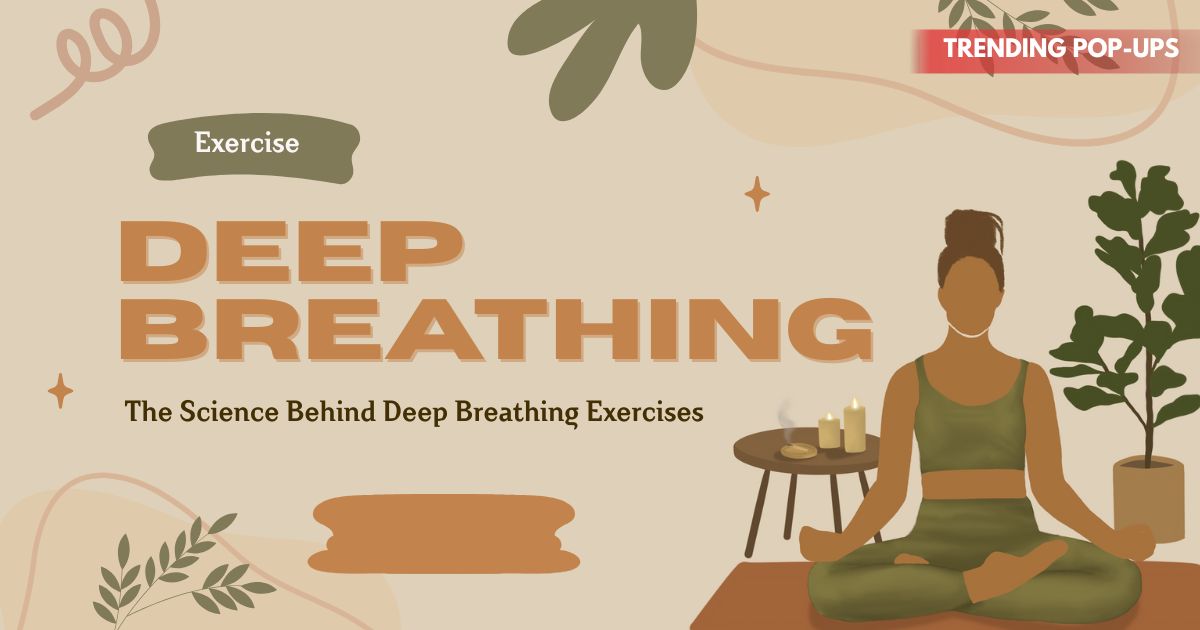In today’s fast-paced world, stress, anxiety, and sedentary lifestyles have become common challenges. Deep breathing exercises, also known as diaphragmatic or controlled breathing, have emerged as a simple yet powerful tool to enhance physical and mental well-being. Scientific research increasingly supports the benefits of deep breathing for reducing stress, improving focus, and promoting overall health. This article explores the science behind deep breathing exercises and why incorporating them into daily routines can be transformative.
What Are Deep Breathing Exercises?
Deep breathing exercises involve slow, deliberate breaths that engage the diaphragm and fully expand the lungs. Unlike shallow chest breathing, deep breathing encourages the intake of more oxygen and the expulsion of more carbon dioxide.
There are several techniques of deep breathing, including:
-
Diaphragmatic Breathing: Engaging the diaphragm to draw air deep into the lungs
-
4-7-8 Breathing: Inhaling for 4 seconds, holding for 7, exhaling for 8
-
Box Breathing: Inhaling, holding, exhaling, and holding each for equal counts
-
Alternate Nostril Breathing: Breathing through one nostril at a time while closing the other
Each technique is backed by research showing improvements in relaxation, oxygenation, and stress reduction.
The Science Behind Deep Breathing
1. Activates the Parasympathetic Nervous System
The autonomic nervous system controls involuntary functions like heart rate, digestion, and respiration. It has two branches:
-
Sympathetic Nervous System: Triggers the “fight or flight” response during stress
-
Parasympathetic Nervous System: Promotes “rest and digest” functions
Deep breathing stimulates the parasympathetic nervous system, lowering heart rate, reducing blood pressure, and promoting relaxation. This is why controlled breathing can calm the mind and body during stressful situations.
2. Reduces Stress and Anxiety
Chronic stress increases cortisol levels, which negatively impacts immunity, sleep, and mental health. Studies show that deep breathing lowers cortisol and activates relaxation pathways in the brain. Regular practice reduces anxiety symptoms, improves mood, and enhances emotional resilience.
3. Improves Oxygen Exchange
Shallow breathing limits oxygen intake and can lead to fatigue, poor concentration, and reduced metabolic efficiency. Deep breathing increases lung capacity, enhances oxygen delivery to cells, and improves the removal of carbon dioxide. This efficient gas exchange boosts energy, focus, and overall vitality.
4. Enhances Heart Health
Deep breathing exercises have cardiovascular benefits. By reducing stress hormones and lowering blood pressure, they decrease strain on the heart. Some studies suggest that consistent diaphragmatic breathing may improve heart rate variability, a key indicator of cardiovascular health.
5. Supports Mental Clarity and Focus
Controlled breathing affects the brain’s limbic system, which regulates emotions and memory. Techniques like 4-7-8 or box breathing stimulate alpha brainwaves, associated with relaxation and focus. Athletes, performers, and professionals often use deep breathing to enhance concentration and decision-making under pressure.
6. Boosts Immune Function
Stress suppresses the immune system, making the body more vulnerable to infections. By reducing stress and enhancing relaxation, deep breathing indirectly supports immune function. Additionally, improved oxygenation and circulation ensure that immune cells are delivered efficiently to tissues throughout the body.
7. Aids in Pain Management
Deep breathing triggers the release of endorphins, natural pain-relieving chemicals in the body. Studies show that controlled breathing can reduce the perception of pain, making it a complementary approach for managing chronic pain conditions, post-operative recovery, and headaches.
How to Practice Deep Breathing Exercises
Step 1: Find a Comfortable Position
Sit or lie down in a quiet space with your back straight. Relax your shoulders and close your eyes if comfortable.
Step 2: Engage the Diaphragm
Place one hand on your chest and the other on your abdomen. Inhale slowly through your nose, allowing your abdomen to rise while your chest remains relatively still.
Step 3: Hold the Breath
Pause briefly for 2-4 seconds, depending on the technique you are practicing.
Step 4: Exhale Slowly
Exhale gently through your mouth or nose, letting your abdomen fall naturally. Focus on the sensation of releasing tension with each breath.
Step 5: Repeat
Practice deep breathing for 5-15 minutes daily. Consistency is key to experiencing long-term benefits.
Tips for Maximum Benefits
-
Practice daily, preferably in the morning or before sleep
-
Combine deep breathing with mindfulness or meditation for enhanced relaxation
-
Avoid over-breathing, which may cause dizziness
-
Integrate breathing exercises into your routine, such as during breaks at work or while commuting
Additional Benefits of Deep Breathing
-
Improves sleep quality by calming the nervous system
-
Supports digestive health by stimulating the parasympathetic system
-
Enhances lung function and respiratory efficiency
-
Helps manage emotional responses, promoting patience and emotional balance
Conclusion
Deep breathing exercises are a simple yet scientifically proven method to improve physical, mental, and emotional well-being. By engaging the diaphragm, reducing stress, enhancing oxygen exchange, and supporting heart and immune health, deep breathing serves as a natural tool for a healthier life. Whether practiced for a few minutes daily or incorporated into meditation routines, the benefits of deep breathing are profound and long-lasting.
Incorporating deep breathing exercises into your daily routine is a cost-effective, accessible, and powerful way to achieve a balanced mind, body, and spirit.
Also Read : The Role of Sunlight in Vitamin D Absorption
FAQs
1. How long should I practice deep breathing daily?
Aim for 5-15 minutes daily. Even short, consistent sessions can provide noticeable benefits.
2. Can deep breathing reduce anxiety and stress?
Yes, deep breathing activates the parasympathetic nervous system, lowering stress hormones and promoting relaxation.
3. Are deep breathing exercises safe for everyone?
Generally, yes. However, individuals with respiratory or heart conditions should consult a healthcare professional before starting a new breathing routine.
4. Can deep breathing improve sleep quality?
Yes, by calming the nervous system and reducing stress, deep breathing can help you fall asleep faster and improve sleep quality.
5. How soon can I see results from deep breathing exercises?
Some benefits, like relaxation and stress reduction, can be felt immediately. Long-term benefits, such as improved cardiovascular health and immune function, develop with consistent practice over weeks or months.



